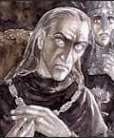Edith Tolkien
Edith was born in Gloucester on the 21st January 1889, the illegitimate daughter of Frances Bratt. Her mother had never married, and never named the father on the birth certificate though she did keep a photograph of him, and his identity was known to the Bratt family. It is not known whether Edith ever knew her father’s name.
Frances brought her daughter up in Handsworth, Birmingham, and Edith had a relatively happy childhood, surrounded by both her mother and her cousin, Jennie Grove. She grew to be remarkably pretty, small and slim, with grey eyes and short dark hair.She quickly showed a talent for music, and played the piano very well.
When Frances died, Edith was sent to Dresden House School in Evesham, a girls’ boarding school that specialised in music. There she met Mabel Sheaf, who continued to be a close friend throughout Edith’s life. By the time she left, Edith was expected to be able to make a career as a piano teacher, or maybe even a concert pianist. However, her guardian, the family solicitor, didn’t really know what to do with the girl. He found her a room at Mrs Faulkner’s, supposing that her landlady’s fondness for music would provide a sympathetic atmosphere and a piano for practice. However, Mrs Faulkner only wanted Edith to play and accompany soloists at her soirees, and would not give her the time to practice. To add slightly to the problem, there was no urgency for Edith to seek employment as she had inherited a small amount of land in various parts of Birmingham, and the rent from these provided her with just enough income to live on.
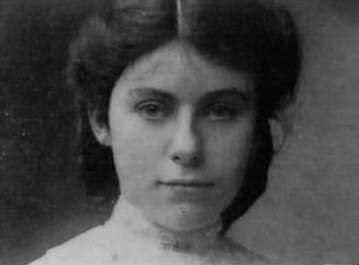
She met the Tolkien brothers at Mrs Faulkner’s and found them very pleasant, particularly John Ronald. Edith and Tolkien soon became allies against “The Old Lady” and took to frequenting Birmingham tea-shops together. They particularly liked a tea-shop with a balcony overlooking the pavement from which they could throw sugar lumps into the hats of passers-by.
Romance was almost inevitable. Both Edith and Tolkien were orphans in need of affection, and they found that they could give it to each other. In the summer of 1904, they decided that they were in love.
In 1909, towards the end of the autumn term, Tolkien and Edith arranged to go for a secret ride in the countryside. But Fr Francis found out, and was deeply shaken by the romance. The priest considered himself a father figure to Tolkien, and demanded that the love affair should stop for both propriety’s, and Tolkien’s, sake. However, he did not specifically bid Tolkien not to see Edith, and so, with the ingenuity of youth, they decided that they could continue to meet clandestinely. One day they spent an afternoon together, taking a train out into the countryside. Another day they went to a jewellers where Edith bought Tolkien a pen for his 18th birthday, and he bought her a wrist-watch for her 21st birthday.
After some time of this secrecy, Edith decided she had to move away from the situation, and she took up an offer of lodgings in a house in Cheltenham with an elderly solicitor and his wife. Soon after that, Fr Francis heard word of their previous meetings, and he banned Tolkien from seeing Edith, only allowing him to see her once more to say good-bye. He put a ban on their communication until Tolkien was 21 – three years away. But until she left Birmingham, Tolkien looked for her everywhere he went, and they did manage a few accidental meetings. But then, as recorded in Tolkien’s diary, Fr Francis found out that they were still seeing each other:
“I had been seen with a girl again, calling it evil and foolish. Threatening to cut short my university career if I did not stop. Means I cannot see E. Nor write at all. God help me. Saw E at midday but would be with her. I owe all to Fr Francis and so must obey.”
On the 2nd March, Edith left for Cheltenham and Tolkien had one last glimpse of her on her bicycle as she cycled to the train station.
Cheltenham
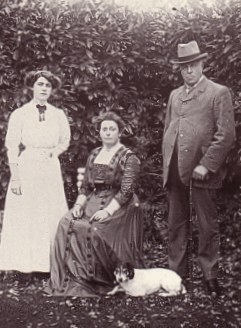
In Cheltenham, Edith stayed with CH Jessop and his wife, and soon started to know them as “Uncle” and “Auntie”. She came to enjoy life in the genteel atmosphere of the Cotswolds, surrounded by non-intellectual, middle-class people – the type of people she found easy to get along with. She gained a friend of her own age, Molly Field, and practiced the piano every day. She also took lessons on the organ and began to play for services at the Anglican parish church that she attended regularly. She threw herself into church affairs, assisting at the Boys Club and the choir outings, and she also went to Conservative Party meetings.
But she still found herself with time on her hands, and only few friends of her own age.
“Edith said she would often work out her frustrations on the piano, playing something powerful and stirring, such as a Schubert Impromptu or a Beethoven sonata. She also spent hours copying music meticulously.”
While in Cheltenham, she decided to marry Molly’s brother, George, and told Tolkien about her engagement when he first wrote to her after his 21st birthday. But she hinted that she had only become engaged because George was kind to her, and that she had given up believing that Tolkien would still care for her.
Tolkien hurried down to Cheltenham, determined that he would change her mind, and after talking with him on the 8th January 1913, she agreed once again to marry him. They did not immediately announce their engagement, both because they were nervous of familial reactions, and because they wanted to wait until Tolkien’s prospects became more certain.
Religion
The question of Edith’s religion caused the couple some concern. She would have to become a Catholic if their marriage was to be blessed by Tolkien’s church. In theory she was happy to do this, but in practice, there were some problems. She had become a very active member of the Church of England, acquiring some status in her Cheltenham parish. Edith would have to go from this acknowledged position to being a ‘nobody’ in Tolkien’s Catholic church. She was also afraid that the Jessops would be angry, as they were vehemently anti-Catholic.
Edith wanted to put off the conversion until they were officially engaged, or even until they were married, but Tolkien wanted her to convert as quickly as possible. He despised the Church of England, calling it a:
“pathetic and shadowy medley of half-remembered traditions and mutilated beliefs”
He considered that as Mabel had suffered for her religion, Edith should also be able to put up with some hardship. So she gave in, at which point the Jessops ordered her to leave their house at the earliest opportunity. She set up home in Warwick with Jennie Grove, a tiny determined woman with a deformed back.
But while Tolkien was determined for Edith to share his religion, he showed little interest in her musical talents, and he rarely wished to share any of his academic life with her. At the same time, he almost smothered her with what must have seemed to Edith to be patronising and immature displays of affection.
She was instructed in the Catholic faith by Fr Murphy, her local parish priest in Warwick, who, unfortunately, only did an adequate job. Tolkien later blamed much on this poor teaching, but, at the same time, he could not help her understand Catholicism as he found it difficult to communicate the deep and unwavering nature of his own faith. She was received into the Roman Catholic church on the 8th January 1914, the first anniversary of her reunion with Tolkien. Soon after, the couple were officially betrothed in church by Fr Murphy.
When Edith made her first confession, and took her first communion, she professed to feeling a great happiness, but this did not last. The Warwick church she later described as “sordid”, and she made few friends among the congregation, even though she helped with the church’s club for working girls. She began to dislike confession, and she started using any of her health worries to avoid going to Mass.
Edith had a fairly dreary life in Warwick. She and Jennie often got on each other’s nerves, and she had no one else to talk to and nothing to do but keep house. She practiced the piano for hours each day, but had little incentive to play as she knew having a husband and family would prevent a musical career. Furthermore, in the local Catholic church, she was not needed as an organist. She missed the social life she had had in Cheltenham, and she didn’t have enough money for more than the occasional visit to the theatre or to concerts. And the letters from Tolkien in Oxford, describing dinners, parties and cinema visits certainly didn’t help either.
After war had been declared, and when it was clear that Tolkien would soon leave for France, he and Edith decided to get married, as both knew that there was a real possibility that he would never return. Edith was 27 and Tolkien was 24. The wedding took place on the 22nd of March 1916, after early mass in Father Murphy’s church in Warwick. It was a Wednesday – the day of the week they were reunited in 1913. Edith panicked when she realised that she had to give her father’s name and profession in the marriage register, as she was illegitimate and knew nothing about her father. She ended up writing “Frederick Bratt” – an uncle, but left the profession section empty. She told Tolkien the truth immediately afterwards, but it only increased his feelings of tenderness towards her. The couple went for a one week honeymoon by train to Clevedon.
On returning from Clevedon, Edith returned to Warwick to wind up her affairs, and then Tolkien settled her and Jennie in Great Haywood, Staffordshire. It had been decided that she would not have a permanent home during the war, but would live in furnished rooms near to Tolkien’s camps. When he was posted temporarily to Yorkshire, Edith and Jennie moved from Great Haywood to rooms a few miles from his camp at Hornsea, and they also stayed there when Tolkien moved to Hull. There was no piano in the boarding house, food was short, and she hardly ever saw Tolkien – Hull was a long way from Hornsea. And she was pregnant – a condition that she found exhausting.
She then decided to move back to Cheltenham – the only town where she really felt at home. Jennie accompanied her, and while they were there, John was born in a nursing home. The labour was difficult, and Edith’s life was put at risk.
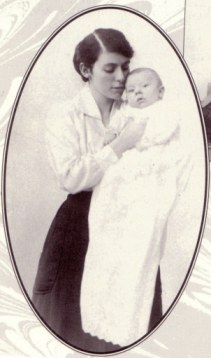
Soon after that, she moved back to Yorkshire, taking furnished rooms at Roos, near Tolkien’s camp. Near Roos, the Tolkiens found a small wood with an undergrowth of hemlock, and there they wandered when he could get leave. He wrote the following of Edith:
“Her hair was raven, her skin clear, her eyes bright, and she could sing – and dance.”
From this came the story of Beren and Lúthien, Lúthien being a beautiful elf that the mortal Beren first saw dancing among hemlock in a wooded glade. This was Tolkien’s first quest story, and the first to contain such a wide range of emotions. It also perpetually remained his favourite, for he identified Edith with Lúthien.
When Tolkien was again moved to Hull, Jennie and Edith refused to move with him as Edith was wearied by looking after John, and she was often in pain.
Oxford
After the War, the Tolkiens moved to Oxford. Soon they decided that they could afford the rent of a small house, and moved to 1 Alfred Street (now called Pusey Street). They moved there in late summer 1919, engaged a cook-housemaid, and brought Edith’s beloved piano was out of storage. Soon she fell pregnant again.
Leeds
But soon Tolkien was offered a lectureship in the English Department of Leeds University, and the family was on the move again. However, Tolkien initially travelled to Leeds on his own as Edith was again too heavily pregnant to travel. After Michael Hilary Reuel was born, at the start of 1921, Edith came up to Leeds, and Tolkien found his family temporary furnished rooms. However, by the end of 1921, they had found a house to rent – albeit it a small, gloomy house – at 11 St Mark’s Terrace.
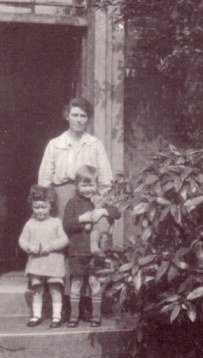
Edith found Leeds refreshingly informal after Oxford, and she quickly made friends with other university wives. There were also informal university dances which she enjoyed.
She became pregnant again, something that she wasn’t entirely happy with, but Christopher Reuel was born that November, and shortly afterwards, the family moved back to Oxford.
It wasn’t until 1929 that Edith got her longed-for daughter, when Priscilla Mary Reuel was born.
Edith’s life in Oxford
Edith’s life in Oxford was one of routine, of caring for her husband and her children. She prepared breakfast, lunch and dinner for all of them, and kept the house, aided by Phoebe Coles, her daily help. She and Tolkien slept in separate bedrooms, for she found his snoring tiresome, and she found that his habit of staying up to late hours didn’t fit in with her daily routine.
After leaving school, she had had little chance to continue her education or improve her mind. Marriage lost her a great deal of independence, as in those times it was accepted that women would not take employment after their wedding. Her piano playing was reduced to a hobby.
She was inclined to be shy, mainly because she had led a very limited social life through her childhood and adolescence, and she was unnerved by the formality of Oxford society. It must not have helped that Tolkien did not encourage her to pursue any intellectual activity. She would not return calls that the dons’ wives made to her, and came to believe that the University was, for her, a closed community. One of the few people she did come to like was Charles Wrenn’s wife Agnes.
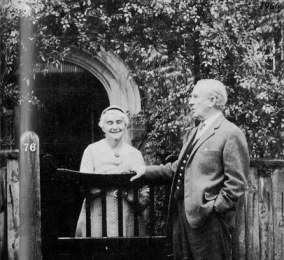
When the family had returned to Oxford, their life never regained the easy equilibrium that they had enjoyed in Leeds. Edith began to feel that Tolkien was ignoring her – while he was loving and considerate, greatly concerned about her health and caring about domestic matters, she could see that he only truly came alive when he was with his circle of male friends, especially CS Lewis. And Tolkien soon came to realise that she was resentful of his friends, eventually beginning to think that the need of male friendship was not entirely compatible with married life. But he believed that this was one of the sad facts of a fallen world, and he thought that a man had the right to companionable male friendships, and if necessary, insist on it.
Edith was also often ill, suffering from headaches which could keep her in bed for a day or more.
In Oxford, she had come to resent converting to Catholicism, and had almost entirely given up going to Mass. She also began to resent Tolkien taking their children to church, and also his rigid insistence on frequent confession – something that she didn’t like doing. Tolkien never discussed religion with her in the same rational manner that he discussed it with CS Lewis, instead, he always showed her his emotional attachment to Catholicism, of which she had little understanding.
To a large extent, Tolkien and Edith lived separate lives at Northmoor Road. He shared little of his writing with her, and of his manuscripts, only the early pages of “The Book of Lost Tales” was in her handwriting. But she did share in the family’s interest when he was writing “The Hobbit” and “The Lord of the Rings”, though she was not well acquainted with the details of his works and did not have a deep understanding of them. But, even though, he was always warmed and encouraged by her approval, and she was the first person to whom he showed “Leaf by Niggle” and “Smith of Wootton Major”.
The circle of academic and personal friends that they gathered around them had little doubt that there was deep affection between them. It was clear in the small things in life – the way they cared so deeply about each other’s health, the way they took so much care in choosing each other’s birthday presents. And one of the major sources of their happiness was their family. This bound them together until the end of their lives, and it was perhaps the strongest force in their marriage, as they loved talking about their children and grandchildren.
Until they moved to Bournemouth, their lives continued to move in different circles. While Tolkien and Priscilla went to Italy, Edith took a cruise on the Mediterranean with some friends. She became friends with Joy Davidman, while Tolkien utterly disliked her.
In 1959, Tolkien retired, and suddenly there was time to sit, and talk, and be silent together. In 1966, it was their Golden Wedding, which was celebrated with much pomp and ceremony with a party at Merton. But Edith was becoming increasingly more lame, and suffered from constant digestive trouble.

By that time, she had been taking holidays in Bournemouth several years, and had made a large number of friends there. After accompanying her on several of these holidays, Tolkien came to realise that she was happiest there, on the south coast by the sea. Furthermore, she could no longer cope with all the housework that needed to be done in Headington, and Tolkien needed a new place to live where his address could be kept secret. So in 1968, when Tolkien was 76 and Edith was 79, they decided to move to a more convenient house in Bournemouth, at 19, Lakeside Road. This was a plain modern house, with a well-equipped kitchen that Edith could easily manage. There was a study, a garage which served as a library / office, a verandah, a garden, and a private gate leading to Branksome Chine and the sea. There was also central heating – a first for the family. They had regular domestic help, and Catholic neighbours took Tolkien to church with them in their car.
They spent a lot of time at the Miramar – the hotel where Edith had previously stayed. It was expensive, but comfortable, and patronised by people similar to the Tolkiens. The social setting of the Miramir was much as Edith had been used to in Cheltenham, being full of upper middle class clients, affluent, unintellectual and possessed of an easy friendliness. The hotel increasingly became an ideal answer to the Tolkiens’ domestic issues, as when the strain of keeping house became too much for Edith, they would hire their usual hire-car driver to take them to the Miramar.
In November 1971, Edith was taken ill with an inflamed gallbladder. She was taken to hospital, and after a few days of severe illness, she died, aged 82. It was Monday, 29th November, 1971.








